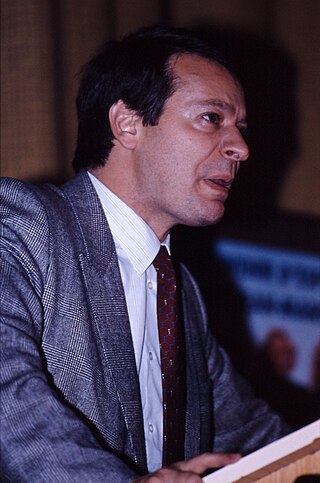
Alain de Benoist, also known as Fabrice Laroche, Robert de Herte, David Barney, and other pen names, is a French political philosopher and journalist, a founding member of the Nouvelle Droite, and the leader of the ethno-nationalist think tank GRECE.

Guillaume Faye was a French political theorist, journalist, writer, and leading member of the French New Right.
The Groupement de Recherche et d'Études pour la Civilisation Européenne, better known as GRECE, is a French ethnonationalist think tank founded in 1968 to promote the ideas of the Nouvelle Droite. GRECE founding member Alain de Benoist has been described as its leader and "most authoritative spokesman". Prominent former members include Guillaume Faye and Jean-Yves Le Gallou.
The Carrefour de l'Horloge, formerly Club de l'Horloge (1974–2015), is a French far-right national liberal think tank founded in 1974 and presided by Henry de Lesquen. The organization promotes an "integral neo-Darwinist" philosophy, characterized by a form of economic liberalism infused with ethnic nationalism.

Roger Holeindre was a French Army veteran, politician and author. He served in the First Indochina War and the Algerian War, was a member of the National Assembly from 1986 to 1988. Holeindre also served as the vice-president of the National Front (FN) where he represented the "national-conservative" tendency, opposed to "nationalist revolutionaries" and Third Position ideologies. Holeindre was the president of the Cercle national des combattants and the honorary president of the Party of France.

Yvan Blot was a French conservative politician. A founding member of the GRECE, he was also the co-creator and president of the Club de l'Horloge.

Jean-Yves Le Gallou is a French politician. He served as a member of the European Parliament from 1994 until 1999, representing the National Front. Since 2022, he has been a member of Reconquête.
Radio Courtoisie is a French radio station and cultural associative union created in 1987 by Jean Ferré.

Jean-Pierre Stirbois was a French far-right politician. Elected deputy mayor in 1983 of Dreux, a city of around 30,000 inhabitants at the time, he was one of the main architects, along with his wife Marie-France Stirbois, of the first electoral breakthrough of the National Front.

Bruno Daniel Marie Paul Retailleau is a French politician who has presided over The Republicans group in the Senate since 2014. He has represented the Vendée department in the Senate since 2004. Retailleau also served as President of the General Council of Vendée from 2010 to 2015 and President of the Regional Council of Pays de la Loire from 2015 until 2017.

Dominique Venner was a French historian, journalist, and essayist. Venner was a member of the Organisation armée secrète and later became a European nationalist, founding the neo-fascist and white nationalist Europe-Action, before withdrawing from politics to focus on a career as a historian. He specialized in military and political history. At the time of his death, he was the editor of the La Nouvelle Revue d'Histoire, a bimonthly history magazine.
Jean-Gilles Malliarakis is a French far-right politician and writer.

Agir, officially Agir, la droite constructive, was a political party in France, established on 26 November 2017. The majority of its founding members were previously associated with the Constructive faction within the centre-right Republicans. Styling itself as a "liberal, social, European, humanist and reformist" party, Agir was founded by a group of 19 established politicians as an alternative to the Republicans. The party merged with Renaissance in 2022.

The NATION Movement, is a Belgian far-right political party founded on 9 August 1999, by nationalist politician Hervé Van Laethem in Belgium. The party is part of the larger far-right and right-wing populist movement in Belgium and has also been involved in the Yellow vests movement.

Remigration, also called repatriation, is a far-right and Identitarian political concept referring to the forced or promoted return of non-ethnically European immigrants, often including their descendants who were born in Europe, back to their place of racial origin, typically with no regard for their citizenship. It is popular especially within the Identitarian movement in Europe. Some proponents of remigration suggest excluding some residents with non-European background from such a mass deportation, based on a varyingly-defined degree of assimilation into European culture.
Stéphane François is a French political scientist who specializes on radical right-wing movements. He also studies conspiracy theories, political ecology and countercultures.

Jean-Claude Valla was a French journalist and a prominent figure of the Nouvelle Droite.

TV Libertés, or TVL, is a French far-right Web TV launched in January 2014. The group is led by Philippe Milliau and Martial Bild, a former Front National leader. TV Libertés is recognized by observers for its professionalism when compared to other French far-right channels, and it seeks to compete with mainstream cable TV. Alain de Benoist and Gilbert Collard, among others, have hosted talk shows on the channel.

Michel Marmin is a French journalist and film critic.
Jacques Rougeot was a French literary critic and political activist.















